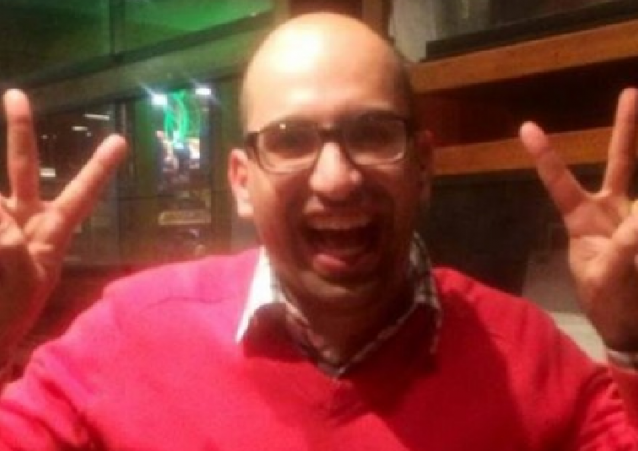U. Illinois Trustees seek to throw out Steven Salaita federal lawsuit
Motion to Dismiss filed.

In late January 2015, Steven Salaita filed a federal lawsuit against the Trustees of the University of Illinois and certain of its senior officers, alleging that they violated Salaita’s contractual and First Amendment rights.
The lawsuit concerns the Trustees refusal to approve a contingent offer of tenured employment after Salaita’s bizarre Twitter behavior and hateful, unhinged tweets. Those tweets led to accusations of anti-Semitism, something Salaita vigorously disputes.
The Trustees now have filed a motion to dismiss the case, embedded below.
I will add discussion and analysis later.
Update 2-26-2015: It’s going to take some time to go through the entire documents (time I don’t have today), so I’ll just provide a summary of the argument. If you want a really quick take — I doubt any of the causes of action will survive other than potentially the 1st Amendment Claim; whether that one survives I’d need to think more about.
The Trustees hone in on the glaring defect in the Complaint I spotted immediately after filing. I wrote:
There is a glaring defect in the Complaint which at least would go to Salaita’s contractual claims and perhaps even his free speech claims. Salaita never says in the Complaint that anyone ever told him that Board of Trustee approval was a formality and certainly would be obtained. That was a condition of the offer, yet in the Complaint Salaita only says he assumed Trustee approval was a formality:
38. Based on the communications and conduct above, as well as standard academic hiring practices, including practices at the University of Illinois, Professor Salaita reasonably believed that approval of the Board of Trustees was a mere formality and that his position with the University of Illinois was certain so long as he remained legally eligible to work.
This will be problematic for Salaita in his quest to turn a contingent offer into an enforceable contract under the doctrine of promissory estoppel. Based at least on the Complaint, no one with authority ever promised him that the Board of Trustee contingency would not apply.
If a court finds no enforceable contract, and that Salaita was just a potential hire, then the University would have more discretion into what it took into account in the hiring process. That would include, as both official and unofficial university faculty committees found, whether the tweets were part of Salaita’s scholarly profile and therefore properly taken into account when judging Salaita’s fitness for the job.
In the Memorandum supporting the Motion, the Trustees’ attorneys write:
Dr. Salaita, then a professor at Virginia Polytechnic Institute and State University (“Virginia Tech”), applied for the position. (Id. ¶ 21.) As part of the application process, on September 27, 2013, Brian Ross, the Interim Dean of the College of Liberal Arts and Sciences, wrote to Dr. Salaita regarding a tenured position in the American Indian Studies Program at the University. (Id. ¶ 25.)
On October 3, 2013, Dean Ross sent a revised letter to Dr. Salaita that communicated a conditional offer of employment. (Id. ¶ 25.) The letter, a copy of which is attached to Exhibit 1,4 characterized the offer as a “recommendation for appointment ” and clearly stated that the recommendation was “subject to approval by the Board of Trustees .” (Compl. ¶ 25; Ex. 1, Doc. 2 at Pgs. 46-47.) (emphasis added). Dr. Salaita signed and returned a photocopy of the letter. (Id.) At no time following the fall of 2013 did anyone from the University, acting in any capacity, inform Dr. Salaita that he had obtained the approval of the Board or that his appointment was no longer subject to the Board’s approval. Plaintiff’s entire Complaint is an unsuccessful attempt to elide this critical fact.
Here’s the summary of the overall argument:
As will be set forth in detail below, each of these causes of action fails as a matter of law.
First, the breach of contract and promissory estoppel claims fail because there was no binding contract and there was no “unambiguous promise” by the University upon which Plaintiff could reasonably rely (Section I). Second, Plaintiff’s civil rights claims fail to state a cause of action because Plaintiff fails to make specific allegations against the Trustees and Administrators, and because the University properly balanced Dr. Salaita’s interest in making his inflammatory statements against the University’s interest in providing a safe and efficient educational environment.
Further, Dr. Salaita was not denied due process because he did not have a property interest in a faculty position, has not alleged that Defendants’ actions have made it impossible for him to find employment in his field, and has failed to allege an actionable agreement among Defendants (Section II). Third, Plaintiff’s various tort claims under state law – tortious interference with contract, tortious interference with business relations, intentional infliction of emotional distress, and spoliation – each fail to establish the elements necessary to plead any of these causes of action (Section III).
Finally, even if Plaintiff were able to state a claim, which he cannot, the Court lacks subject matter jurisdiction over the Board and the Trustees and Administrators in their official capacities based on the doctrine of sovereign immunity, and the Trustees and Administrators are entitled to qualified immunity in their individual capacities (Section IV).
——————
Salaita v. Kennedy – Motion to Dismiss and Memorandum in Support
 DONATE
DONATE
Donations tax deductible
to the full extent allowed by law.








Comments
A very well-drawn pleading, setting out killer arguments.
It’ll be interesting to see the response. This may be the end of this lil’ exercise in stupid.
If the First Amendment claim survives, might that positively affect free speech claims made by conservatives on campus?